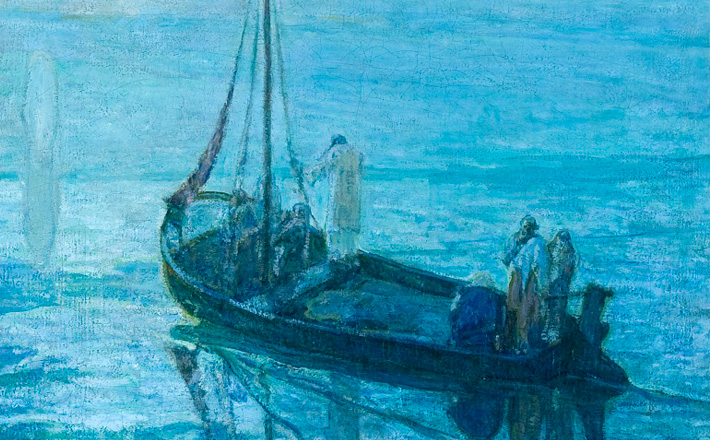Commentary on 1 Kings 19:9-18
This text may pose the same problem for you that it poses for me.
If we decide to preach it, we’ll need to deal with the problem in our heads and hearts before we let anything come out of our mouths. So let’s think about the problem — the proverbial elephant (and the donkey) in the room — before we do anything else.
Toward the end of the passage, God tells Elijah to anoint new kings of Syria and Israel. In other words, the Lord tells Elijah to get involved in politics. I happen to be writing these words on the day (May 4, 2017) that these two things happened in Washington, D.C.: (1) the House of Representatives passed a bill (the American Health Care Act) the purpose of which is to “repeal and replace” the Affordable Care Act, and (2) the President signed an Executive Order on “Promoting Free Speech and Religious Liberty.”
I don’t bring these actions up to discuss their merits (or lack thereof) but to point out a few things. First, politics is an important part of our life in the world. The actions of politicians have real implications for real people, and since we care about people, we care about such implications.
Second, it’s difficult (and sometimes wrong) not to sometimes sound “political” in our sermons. Moral and ethical issues are political issues too. Third, ninth-century BCE Israel was not a post-Enlightenment constitutional republic. Our circumstances and systems are different. Still, the fact that we don’t live in a theocracy doesn’t mean that God doesn’t care what happens here and that we shouldn’t be involved.
I’m not trying to tell you what to think about all of this. I am suggesting that we beware preaching this text in a way that says, “God told Elijah to go get involved in power politics, so we should too.” But I’m also suggesting that we can’t just say, “That was then, then is now, and so we just have to stay out.” The art — not to mention the grace and love — is in how we do what we do and in how we lead members of our congregations to do what they do.
I and Thou
Ahab was a ninth-century king of the Northern Kingdom of Israel. He married a Phoenician princess named Jezebel and joined her in worshiping Baal. Elijah appeared as the champion of the Lord (YHWH), announcing a drought. Following the contest between YHWH and Baal at Mt. Carmel, which the Lord won, Elijah orchestrated the slaughter of the prophets of Baal. Jezebel was displeased and sent word to Elijah that she was going to have him killed. He fled for his life, going into Judah, and so hopefully beyond Ahab and Jezebel’s reach. He travels forty days and nights through the wilderness until he reaches Mt. Horeb. There, Elijah has an encounter with God.
God asks Elijah what he is doing. As our text opens, Elijah is in a cave on Mt. Horeb. The “word of the Lord” (1 Kings 19:9b) comes to him. The Lord poses a question: “What are you doing here, Elijah?” The short answer would be, “Running away from Jezebel,” but that’s not what the prophet says. His answer has three parts (19:10):
- “I have been very zealous for the LORD, the God of hosts.” He vouches for himself to God. He has been seriously and actively committed to the Lord’s cause.
- “For the Israelites have forsaken your covenant, thrown down your altars, and killed your prophets with the sword.” This is an accurate description of how bad things are.
- I alone am left, and they are seeking my life, to take it away.” We’ll come back to that one.
God tells Elijah what to do. God responds to Elijah’s answer by telling him, “Go out and stand on the mountain before the Lord, for the Lord is about to pass by” (1 Kings 19:11a). Elijah’s forty-day journey to Mt. Horeb should have already put us in mind of the Moses story. The verses following 19:11 further develop that parallel (see Exodus 33:17-23).1 Moses had already done much in service to God before the Lord passes by him, and so has Elijah. But also like Moses, God prepares Elijah for additional service. A violent wind, an earthquake, and a fire strike the mountain, but the Lord isn’t in any of them. Instead, the Lord is in “a sound of sheer silence” (verse 12b: “a still small voice” is the well-known King James Version rendering). The impression is of an awesome stillness.
The voice of the Lord addresses Elijah from the stillness, asking the same question it had posed earlier: “What are you doing here, Elijah?” (verse 13). And Elijah gives the same answer three-part answer he previously offered (verse 14). Before, God told him to wait for the Lord to pass by. And the Lord in fact came.
This time, though, God tells the prophet to get going. There is important work to be done, and Elijah must do it.
… and We
You’ll recall that part three of Elijah’s three-part answer to God’s twice-stated question was, “I alone am left, and they are seeking my life to take it away.” God now responds, “I will leave seven thousand in Israel, all the knees that have not bowed to Baal, and every mouth that has not kissed him” (verse 18). Elijah is not all alone. He has a faithful community of which he is a part and alongside which he can serve.
There are some interesting possible connections between this text and the Gospel reading for this week. Matthew 14:22-33 tells the story of Jesus walking on the water to the disciples. Peter asks to walk on the water to Jesus, and Jesus gives him permission. When he notices the wind, Peter begins to sink, and Jesus has to rescue him. When they reach the boat and the wind ceases, the disciples acknowledge Jesus as the Son of God. As in our text, the stillness provides an opportunity to know that God is present.
But here’s a question to ponder: did Peter need to leave the boat and try to walk to Jesus? Jesus was coming to the disciples. What (if anything) was Peter trying to prove? Might he have wanted to demonstrate that his faith was superior? Might he have been better off staying in the boat with the rest of the disciples?
Elijah was not alone; he was part of a community. Peter didn’t need to step out alone; he was part of a community. We thank God for the I-Thou relationship. Let’s also thank God that we are part of an I-Thou-We community.
Notes
1 Walter Brueggemann, 1 & 2 Kings, Smyth & Helwys Bible Commentary (Macon, Ga.: Smyth & Helwys, 2000) 235.


August 13, 2017